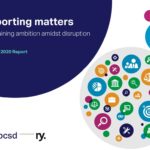Research findings developed with Boston College Center for Corporate Citizenship, Net Impact and World Business Council for Sustainable Development assess trends and best practices in corporate responsibility communications.
Transparency in communications is a key indicator of a socially responsible company more important than philanthropy or NGO partnerships according to a landmark corporate responsibility and sustainability communications report launched today by Edelman, the world’s largest independent public relations firm.
The report, "Corporate Responsibility and Sustainability Communications: Who’s Listening? Who’s Leading? What Matters Most?" was developed in collaboration with the Boston College Center for Corporate Citizenship, Net Impact and the World Business Council for Sustainable Development (WBCSD) and can be found online at www.edelman.com/expertise/practices/csr/.
"We have seen an explosion of interest, debate, and analysis concerning corporate responsibility and sustainability," said Chris Deri, executive vice president and global practice leader of Edelman’s Corporate Social Responsibility (CSR) & Sustainability Practice. "We wanted this report to provide both practical and actionable findings specifically tailored for communicators."
The report assesses trends and best practices in corporate responsibility-focused communications, as well as the effectiveness of newer communications efforts. Key findings address the role of transparency as an indicator of responsible business practices, the expectation for companies to lead on key global health and social issues, and the importance of investors and employees (current and prospective) as key audiences:
Transparency is a key indicator of a socially responsible company. Being transparent about business operations, future goals, and treatment of workforce are vital indicators for stakeholders assessing corporate responsibility and sustainability. In fact, 45% of survey respondents agreed that communicating both positive and negative performance ranked among the three most important activities for a socially responsible company to engage in.
"More companies are realizing that authenticity is the key to effective corporate responsibility communications," said Peggy Connolly, communications director at the Boston College Center for Corporate Citizenship. "This research reveals the importance of companies being real, relevant, and responsive to key stakeholdersinternally with employees and externally with NGOs and others."
Stakeholders expect companies to lead not just manage risk on key issues. No longer does it suffice for companies to simply manage risks on certain global issues such as climate change, human rights, and poverty alleviation.
Employees and socially responsible investors have emerged as key communications audiences due to their impact on a company’s bottom line. Investors are increasingly looking at corporate responsibility as a proxy for good management and view solid practices as a mark of a healthy approach to risk and opportunities. In fact, 39% of survey respondents said they were more inclined to purchase products from companies they considered socially responsible.
Study participants also agreed that directing corporate responsibility-focused communications at employees is empowering for them and a company’s programs. "Employees are a company’s most valuable resource when it comes to putting corporate responsibility initiatives to work," said Liz Maw, Executive Director, Net Impact. "This research highlights just how important it is to communicate a company’s responsible business practices to employees."
Companies often neglect an important corporate responsibility communications audience: prospective employees. Corporate communicators could do much more to leverage responsible business practices as a recruiting tool, especially since today’s job seekers tend to research a company’s performance in this area. In fact, 62% of survey respondents report that their recruitment materials failed to emphasize this information.
"Corporate Responsibility and Sustainability Communications: Who’s Listening? Who’s Leading? What Matters Most?" is informed by an international survey of 3,100 global opinion leaders, interviews with NGOs and multilaterals, regulators, media and executives from global Fortune 500 companies, and a survey of Net Impact’s international membership.



